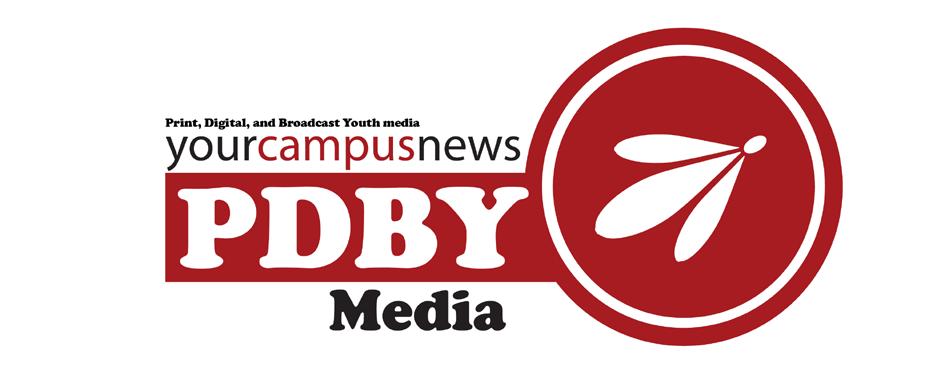








Let’s just say the 2022 SRC presidential manifestos, blew me away, and not in a good way. So, I’m just going to leave our impressions of the candidates here:
The impressions of the presidential candidates varied on their style, but two things certain individuals had in common was their propensity to tear their competition down or say things that left my mouth wide open for the majority of the presentations.
A stand out here was Angela Monaheng, who is affiliated with Action SA. In a response to a question on allegations of xenophobia against Action SA she said the following “the misconception is that it’s for all foreigners or for all people who are out of the country, and that’s not true. The thing is, it’s when illegal immigrants are causing crimes, kidnapping our children, raping our women, human trafficking, and if you can think about it from a logical sense, would you not clean your house before you invite guests. [...] I love everyone. Action SA loves everyone. [...] We’re inclusive [...] That xenophobic stuff. No. No. That’s not for us”. In other words, her response can be summated as follows – we are not xenophobic, but we hate foreigners.
Another stand-out was orator Liam CHAD Jacobs who really embodied a spirit of kayfabe that only a seasoned pro-wrestler could show (thanks for teaching me a new word Banathi). Liam won the attention of the piazza while running not only his mouth but his legs back and forth in front of students, while baking in the sun. Liam Jacobs seemed to attempt to appeal to middle to upper-middle class students, by presenting three main issues: registration, parking, and safety. I have to wonder if Jacobs is genuinely out of touch with the reality of student issues or if he carefully
selected three problems that he knows would garner favour from a certain demographic of students, but ultimately has no or very limited solutions. What are you going to do about parking and safety that years of SRC members have been unable to? However, this remains to be seen. What was seen though was Jacob’s confidence and boisterous energy, which seemed to garner favour from certain students present?
Next up we saw SASCO candidate, Sicelo Ngwenya, who recognised his “main” competition from the outset and set his eyes on Liam Jacobs. Remarking on how Jacobs is a reject and failed experiment of SASCO, he played his cards widely by banking on Jacob’s party switching history to allude to an idea that Jacobs might lack political conviction. In doing so he seemed to garner some legitimacy for the SASCO cause because even DASO’s leading figure was described as a SASCO by-product. However, Ngwenya did not solely focus on Jacobs and took questions regarding transformation, GBV, and other issues in stride.
On the other hand, we saw Neville Mupita, a previous SRC member, who was unremarkable in any shape or form. This was due to his poor decision making that led him to point out his role in an effective previous SRC which garnered a uniquely negative reception from the crowd. It seemed that everyone appealed to someone – yet Neville appealed to no one.
Next up on the block is Sizwe, who seemed to appeal to poorer students and who took a unique approach by not presenting a manifesto, yet still received cheers from the ranks of the EFFSC. Although his approach was unique, it left much to be desired and left me feeling like he rocked up to a job interview without any understanding of the job before him. But hat’s off to him.
Speaking of the EFF, the next speaker was the EFFSC’s presidential candidate Njabulo Sibeko. He was more substance than form and seemed
to display a wide knowledge of the problems students are facing. I will say, that although I found myself put off by the political affiliations of all the presidential candidates, Njabulo seemed to be among the group of candidates who were more well-read, and struck a nice balance between roasting his fellow candidates while also answering student questions with a good amount of flair.
The last candidate on the roster was Varnu Govender, who presented his manifesto the day before the other candidates, but unfortunately, his absence affected his ability to be contrasted against his competition.
Although, the candidates touched on their plans for the year, what stood out was their responses to genuine and pressing student questions. Some students are inevitably going to cast their vote in favour of one of these candidates. All I have to say is, although I was entertained during this “circus”, why should I even cast my vote when, as a student, I was amongst a group who was on the receiving end of large amounts of condescension by these same candidates? Not only condescension but what came across as a general disregard for real student issues.
But I also have to wonder how our future president is going to address the 2023 increase, no matter their method, considering that the 2022 SRC tried and was unsuccessful.
Until next time, Leah and Banathi
PDBYMedia, formerly Perdeby, is the official independent student newspaper of the University of Pretoria. We are committed to providing fresh and entertaining news content for UP students, by UP students, about UP issues.
Editorial
Editor-in-chief carel.willemse@up.ac.za
Carel Willemse @Ed_in_Chief
Editor editor@pdby.co.za
Leah Rees @pdbymedia
Digital Manager digitalmanager@pdby.co.za
Leah Rees @pdbymedia
Print, Digital, and Broadcast Youth Media

News news@pdby.co.za
Amukelani Makamu @khelanimeigh.rsa
Deputy News news@pdby co.za
Mothusi Mokalane @mr_mokalane
Features features@pdby.co.za
Kirsten Minnaar @kirsten_minnaar
Entertainment entertainment@pdby.co.za
Ashleigh Pascoe @ashleigh.pascoee
Sport sport@pdby.co.za
Katherine Weber @isleepalldayandallnight
Copy copy@pdby.co.za
Ntokozo Xulu @ntokozo__xulu
Visuals visuals@pdby.co.za
Masehle Mailula @masehle_mailula
Multimedia multimedia@pdby.co.za

Masehle Mailula @masehle_mailula
Layout layout@pdby.co.za
Kelly Anne Kong Kam Wa @kelly.anne15
Web webeditor@pdby.co.za

Social Media socialmedia@pdby.co.za
Marketing marketing@pdby.co.za
Copy: Nondumiso Mntambo
Lee Tankle
Lwando Mfundisi
Kamogelo Thando Mabe
Luka Joubert
Zanrie Linstrom
Karla van Dyk
Layout: Khumbulani Chaima
Multimedia:
Cletus Mulaudi
Madeeha Hazarvi
Tshepang Rihlampfu
Sanele Zulu
Anneke Laaks

Sharon Dumba
Jaime Lamb
Web: Onele Gabadu
PDBY appreciates that freedom of speech is an inalienable right enshrined in the Constitution of the Republic South Africa. We encourage our readers to engage in discussion and debate on issues that affect them through letters to the Editor, comments on our website, tweets, or posts on Facebook. We ask our readers to keep the following in mind:
1. PDBY will not edit letters, comments, tweets, or Facebook posts in any way.
2. PDBY will label letters, comments, tweets, or Facebook posts as opinion. These do not represent the views of PDBY in any way.
3. The PDBY editorial must approve letters, comments, tweets, or Facebook posts before they are published.
4. PDBY will not publish letters, comments, tweets, or Facebook posts that are defamatory, or libelous, or that contain offensive content.
5. PDBY reserves the right to practice discretion when publishing letters, comments, tweets, or Facebook posts.

6. PDBY reserves the right to publish any content we receive unless the sender specifically requests otherwise.
7. PDBY reserves the right to retract a letter, comment, tweet, or Facebook post after it has been published.
8. PDBY will not accept responsibility for any consequences the author of a letter, comments, tweets, or Facebook posts may experience as a result of the letter being published.
9. PDBY will only publish letters between 150 and 200 words.
10. PDBY will not publish letters unless the writer confirms their full name, student number and contact number. PDBY will not publish this information, we need it for our records.
deemed
PDBY asked DASO how they obtained the contact information of students, not registered with DASO. Moses asked if these students had verified that they were not registered members. After this was answered in the affirmative, she responded, “interesting […]”.

The August demonstrations featured various student leaders which included SRC members, faculty house chairpersons, executive committee members, and independent candidates contesting the increase on the 2023 first payment amount. However, DASO (the DA Student Organisation) was the only political organisation who did not participate in any of the demonstrations.
When asked about their absence, Shaina Moses, the chairperson of DASO, said that “DASO does not believe in disrupting class”. She continued, “we do believe that each student has the right to an education […]. If the protesters are fighting for students to be educated, then we have the opportunity right now. DASO does understand the grievances of all the students […]. Our opposition, their approach is to protest. However, DASO does not believe that a protest will rectify the situation at hand, but that does not mean that because DASO isn’t partaking in the protest that we do not prioritise the situation. We just handle it in a very different manner.”
The petition
DASO’s approach to the increase was made clear on 25 August, when several students received an SMS from DASO that read: “Stop the shutdown! DASO has a solution for you. Follow the link to sign DASO’s registration fee petition.”
The link provided in the text messages led to a Google document which read: “The Democratic Alliance Student Organisation calls upon the University of Pretoria [management] to engage DASO UP on the proposed 2023 Registration Fee Increase.” This petition stated that DASO had two proposals, namely that “University of Pretoria management [re-enters] into talks with student structures to discuss the proposed registration fee increase” and, in light of the “major financial impacts Covid-19 had on many families”, that “University of Pretoria management creates a process to allow academically deserving students to apply for exemptions to the registration fee increase”.
However, it was unclear how DASO got a hold of the contact information of these students, to be able to send out this petition.
The text
When asked how DASO received the contact information of the students who received this message, Moses responded that it was from “many of [their] members who are registered, of course”. However, a number of students who received this
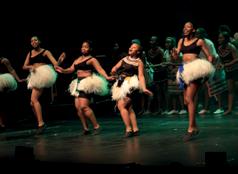
message were not registered DASO members. One student confirmed that they were previously registered with DASO; while several other students confirmed that although they knew members in DASO they had never registered themselves. Some students even confirmed that they were not registered voters or South African citizens (with and without permanent residence) and thus would not appear on the voter’s roll. Another student confirmed that they had never been registered with the organisation, nor, to their recollection, had they ever had any contact with anyone who was registered with DASO. Similarly, first-year law student Adelle Jansen said, “I have never had any interactions with them before, but I just suddenly received a message from them, and I didn’t even know who they were until I asked some people about it.” So, it is unclear how DASO managed to obtain the cell phone numbers of so many students.
PDBY asked DASO how they obtained the contact information of students, not registered with DASO. Moses asked if these students had verified that they were not registered members. After this was answered in the affirmative, she responded, “interesting […]”. Upon being asked if she knew how this could have happened, Moses replied, “no, I was not really in charge of that department, so I’d have to verify with […] our members who were.”
A violation of POPI?
The allegations levelled concerning the way DASO obtained the contact details of students indicate a potential violation of UP’s Constitution for Student Governance (CSG). In terms of section 7 of the CSG, “every Student has the right to confidentiality of his/her University records, and no information contained in such records may be disclosed without the permission of the Student in question”. A student’s contact details would fall within the ambit of this section.
Furthermore, this matter could also constitute a potential violation of the Protection of Personal Information Act 4 of 2013 (POPI), specifically sections 5, 11, and 12 of the Act. Additionally, this is also a potential violation of section 14 of the Constitution of the Republic of South Africa, which states that everyone has the right to privacy, including the right not to have “the privacy of their communications infringed”.

Tarik Lalla, the secretary general of the SRC, said, “obviously we’re well aware of the fact that [students who were not registered with DASO and received this message is a] violation of the POPI Act, […] where they get the numbers from”.
PDBY reached out to the Constitutional Tribunal on 26 August for an advisory opinion on whether these messages did violate the aforementioned sections, but initially they did not deem the matter to be particularly urgent.
However, PDBY informed DASO that the way in which the message was sent out to students was potentially a violation of the sections outlined above, but DASO declined to give comment on the matter. Despite this information, the link to the Google document contained in the text message remained operational. Furthermore, Moses uploaded a story promoting the link to the petition on her Instagram account after she was made aware that a number of students, who were not members of the organisation, received the message. Additionally, Moses explicitly stated that she would verify whether students who were not part of DASO received this message and get back to PDBY on the matter. Moses had not verified this and gotten back to PDBY , at the time of print. DASO members Nikita Scoble, who is running for the SRC’s marketing, media, and communications profile, and Christo Pretorius, who is running for the SRC secretary general profile, also declined to give comment on the matter.
These developments are contrasted by a similar set of facts which preceded them in 2021 where Jacobs allegedly reported his opponent in the run for chairperson of House Humanities, Captain Shongwe, for sending campaign messages to a number of Humanities students. Shongwe obtained these numbers from module groups and was subsequently disqualified. Upon being questioned regarding this matter, Shongwe also revealed that Jacobs messaged him via Whatsapp as part of his own campaign in 2021. Thus, Jacobs used a means similar to Shongwe to promote himself. When PDBY reached out to Jacobs seeking comment on this, Jacobs offered no comment.
Finally, at his SRC presidential manifesto presentation, Jacobs spoke on the lawfulness of DASO’s communication. Relying on section 31 of POPI Jacobs said, “[It] allows for political parties to access the data of any voter that is on the voters roll in South Africa, so as far I’m concerned that’s completely legal.” On reading, section 31 of POPI, the Act excludes “institutions founded on political principles” from the general prohibition against processing a data subject’s personal information if they: are a member or employee; or where it is necessary for founding the party; or for a national or municipal election or campaigning for a political election or cause. Section 31 takes it a step further, in saying that the information that these institutions may process cannot be supplied to a third party.
In light of this, Jacobs’ reply offered at the manifesto is not reflective of the content within section 31. However, DASO could only be acting in accordance with section 31 if there was no third party involved to which they either: supplied the information from or to. After several attempts to reach DASO to confirm the aforementioned, DASO has declined to give comment directly addressing this question.
As the world is becoming increasingly globalised through media, transportation, and the rapid development of digital technology, so are our identities. The globalised era has birthed the ‘global citizen’ which is an allinclusive identity centred around the idea that we are all citizens of any part of the world by virtue of our interconnectedness. However, the idea of a global citizen poses a threat to marginalised cultures that have not had the opportunity to meaningfully establish themselves in the global system. So, how can African culture be preserved in the globalised era, well an answer can be found at UP Ovuwa.
On 25 August, UP Ovuwa held an electrifying performance showcasing the beauty of several Southern African cultures through music and dance as part of the weeklong UP Music Festival. PDBY held an exclusive interview with the director of UP Ovuwa, Mxolisi Duda, to find out more about how UP Ovuwa is promoting and preserving African culture and art. According to Duda, UP Ovuwa can be described as “a cultural ensemble that promotes, preserves and celebrates African musical art through indigenous music, dance and poetry”. The only way culture can be preserved is when it is passed down from generation to generation. UP Ovuwa fulfils this preservation role in several ways. Duda cited that some members of the ensemble have never been exposed to indigenous African cultures and through their time at UP Ovuwa, members not only celebrate African culture through performances, but they also gain knowledge of African culture. Duda further added that UP Ovuwa also aims to be an educational resource for audiences by providing pamphlets that accompany performances to explain to audiences the meaning and significance behind the various aspects of the show. According to Duda the aim of UP Ovuwa is to ignite a sense of pride in the identities African people and that this sense of pride is, “knowing who you are not because other people don’t exist but because we all coexist”.
PDBY also spoke to a member of the UP Ovuwa ensemble, Geraldine Mboweni, about her time at UP Ovuwa and she highlighted the positive impact UP Ovuwa has had on her. Not only has she successfully learned various indigenous African dances, with no prior experience, but she has also gained an appreciation for her own culture and other African cultures as well.
By taking an exclusive look at UP Ovuwa it is evident that African culture can survive the globalised era. These cultures have an established voice in the global system - if the arts are funded and individuals are given the creative freedom to create spaces that promote the transfer of indigenous African knowledge across generations.

On 22 August the Student Representative Council (SRC) called a mass meeting following UP’s decision to increase the 2023 first payment amount for all students. The SRC has released a series of press releases stating that they are against this decision as they believe that “it is not simply an increase in the registration fee, but a means to gatekeep Higher Education”. UP stated that its reasoning for the increase is that fees have not been adjusted for seven years, since 2016, and that costs are rising because of inflation.
The changes to the ‘registration fee’ or the first payment for 2023 are as follows:
• Undergraduate students: R7500 (an increase of R2500)
• Post-graduate students: R10000 (an increase of R2500)
• International undergraduate students: R40000
• International post-graduate students: 50% of the total 2023 fee
According to UP, this first payment does not apply to NSFAS students or students who are sponsored externally and that “the first payment, due at registration, is part of the total annual fee and is not in addition to it”.
On 17 August, SRC President, Thuto Mashile, received a communique from the Vice-Principal of Student Life, Prof. Mosia stating that “the Executive [has] decided to uphold the decision to increase the initial fee payments for all students. Prof. Mosia explained that the reasoning behind the decision, despite their engagement with the SRC, is “to ensure the financial sustainability of the university for quality world class education”. Following this email the SRC decided to call for a mass meeting to engage with the student population regarding the 2023 first payment increase.
The mass meeting
Mashile, opened the mass meeting by saying that “as the SRC we have engaged the management of this university on several
occasions […] on the same day we released a statement rejecting the fee increment”. Mashile went on to say that after multiple attempts to try to get the university not to increase the registration fees, UP still went ahead with the increase. Mashile told the student body present at the meeting that the SRC has exhausted all consultation processes - “basically [UP] didn't hear our suggestions, they totally ignored our cries and pleas and they chose to continue with increasing the fees and prioritising themselves over giving the students an opportunity to access education”.
A student, Kefentse Mabogoane, told the student body that they calculated this fee increase and said that “we actually got the calculations done, by a stats student, an investment student […] and we realised what UP did. It raised the fees by more than what is suggested by the Department of Higher Education”.
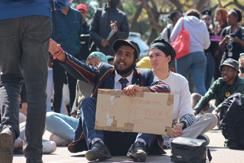

The Department of Higher Education and Training proposed an increase of 4.23% in tuition fees in February for the 2022 academic year. Higher Education, Science and Innovation Minister, Dr Blade Nzimande, stated that the costs associated with the provision of a university education are increasing due to multiple factors which include but is not limited to an increase in workers’ wages. According to Minister Nzimande, it is not sustainable for university fees to increase by an amount lower than inflation. However, although the increase in UP’s initial fee seems to go against Minister Nzimande’s recommendation as it exceeded it by 47.77%, “the first payment, due at registration, is part of the total annual fee and is not in addition to it” meaning that UP has not increased tuition costs, which was recommended by Minister Nzimande. However, it cannot be denied that even if tuition costs remain the same, the increase does place a financial burden on certain UP students. Mashile highlighted that even with the current registration fee, the SRC and various political organisations are assisting students with tuition fees at the beginning of every academic year, therefore this increase will add to the already high number of students who cannot afford tertiary education.
Secretary General of the SRC, Tarik Lalla, also addressed the students present at the mass meeting saying that “the fact of the matter is that the university cannot tell us that increases are due to economic difficulty knowing very well
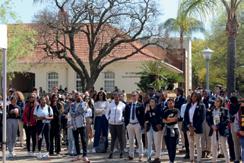
that our students are facing that same difficulty”. Lalla went on to boldly say that “they are going to threaten us, they are going to tell us that we are going to be suspended, it's fine, let them come, we are ready […] as students, we refuse to be quiet about these issues.” Lalla told PDBY that “[they] are consented by section 12 of the Constitution to assemble and demonstrate peacefully”.
Mashile, closed the floor by saying that “going forward, as proposed by the students of the University of Pretoria, we must shut down this university, business cannot continue as usual, students cannot continue attending lectures, people that work at admin cannot continue working every day and coming to campus as if everything is okay. So the way forward now is that no lectures must continue”.
The demonstrations on Hatfield’s campus and UP’s response
Following the mass meeting, members of the SRC and varying numbers of the student body continued to demonstrate across UP’s Hatfield Campus on 22 and 23 August as a means of displaying their rejection of UP’s decision. Their activities ranged from the disruption of classes, to singing, and blocking roads, gates as well as bus terminals. At 11:40 on 23 August, Prof. Kupe responded to the mass meeting and the following demonstrations in an email.
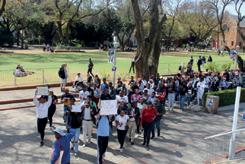

The email stated “[yesterday] a small group of students disrupted a few classes on the university’s main campus in Hatfield. This is unacceptable, and we are taking steps against those in breach of our institution’s policies and who have made themselves guilty of misconduct”. Prof. Kupe continued, stating that the “university held off increasing fees earlier because of the financial hardship of students and the COVID-19 pandemic. However, the financial situation of the university has meant that an increase can regrettably no longer be put off. The increase will not affect all students.” This email emphasised that UP did not have any option other than to implement this increase. “While an increase of this nature is never easy, all other available alternatives were carefully considered, and we were left with no other option. Not only is this in the interest of the university’s financial sustainability, but it is also part of our continuing efforts to ensure we provide all our students
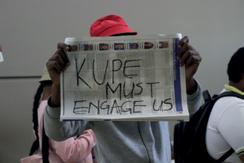
with a quality education. We have several financial support measures in place to assist students who experience financial difficulties and will do everything we can to help them. The success of our students remains paramount.”
Following this communique from Prof. Kupe, the demonstrations continued with the aim of getting Prof. Kupe to address students regarding the increase in person.
On the afternoon of 23 August, students blocked the entrance and exit lanes at the bus terminal on UP’s Hatfield campus. Following this the SRC had a meeting with Security Services regarding the blockages. During this meeting, SAPS was deployed to assist in negotiations where Lalla and Mashile stressed that demonstrations would continue until Prof. Kupe addressed the student body. Lalla responded to this meeting saying “it wasn’t anything that we didn’t expect because security services are not going to give us the answers we need. That’s why we have asked for the ViceChancellor or someone in executive management. Unfortunately, they were not available. Maybe they chose not to be available, or maybe they are unavailable, we don’t know”.
Following these blockages, UP’s Department of Facilities Management released a communique on ClickUP saying that “the bus terminal at Hatfield has been hijacked by the protesting students since [23 August]. Our buses are therefore not able to operate from the terminus.” Rumours have since circulated that the students demonstrating had hijacked buses at the terminal, which is false, as the students present only prevented the normal operation of the bus terminal.
The demonstrations on Groenkloof campus and UP’s response
On 24 August, students then attempted to move to Groenkloof campus in order to further engage with students by utilising UP’s bus services. According to Security Services, the bus containing the students and members of the SRC was not allowed to leave but declined to give further comment on the matter. PDBY contacted Rikus Delport, the Director of the Department of Institutional Advancement, with regard to this incident and received the following comment“we are aware of the protest action by a small group of students who are attempting to disrupt
the activities on the Hatfield campus, including interfering with and preventing buses from transporting students between different campuses. While we respect the rights of students to protest, it should be done in a peaceful manner with respect for the majority of students and staff who want to continue with the academic programme. It is important to note that only a small group of students are responsible for these disruptions”. Following this incident, students attempted to shut down UP’s Groenkloof campus by blocking gates and preventing the entry to or exit from Groenkloof campus. At Groenkloof Campus, these students willingly negotiated with police, and following these negotiations they elected to stop blocking the gates.
Mashile addressed the students on Groenkloof campus on 24 August and stated that “as the SRC we have exhausted the escalation policy […]. The only language that they understand is when we as students do this. And I’m saying guys, that we need to do this. This is not violent as they are making it appear […] We are being as peaceful as possible. But for this shut down to be effective we need to unite.” Mashile continued saying “what is the point of going to class today if you don’t know if you’re going to be able to come back next year?” In his address to the students at Groenkloof, Lalla also emphasised this point. “[what] is a week of class when there is a lifetime of education being taken away from us?” Furthermore, Lalla also expressed that they had informed SAPS of their intention to return to Groenkloof campus the following day and continue the campus shutdown, and that they would once again be willing to engage with the officers on scene.
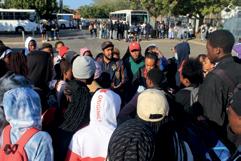
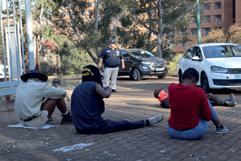
However, on 25 August, in anticipation of the shutdown, UP management elected to close all gates on Groenkloof and suspend in person activities. Deputy Dean, Salome Human-Vogel, emailed all students with the subject line “Student Action on Groenkloof, Mamelodi and Prinshof Campus”. This email stated that “Due to action today on Groenkloof Campus” teaching activities would take place online. However, unlike what the subject line would imply, Mamelodi
registration fees. That is the commitment that we’re going to follow throughout.”
and Prinshof Campus were never directly affected by the student action and at that time the demonstrators had no apparent intention of moving to those campuses.
The conclusion
Although UP has stated that the reasoning for the increase has been communicated to students, UP initially only offered an official explanation via a graphic posted on their Instagram page, which contained minimal detail. This graphic also only followed the decision of the SRC to hold a mass meeting. PDBY reached out to the Director of the Department of Student Affairs, Dr Matete Madiba, to find out when students would have been alerted of the first payment increase, if it had not been for the mass meeting. Dr Madiba responded saying that because UP was still engaging with the 2022 SRC, the communication to students was delayed. Dr Madiba further explained that the first payment increase is more complicated than the reasoning laid out in the graphic. She said that the increase is necessary to allow the university to have sufficient cash flow in the beginning of the year, to assist NSFAS students who do not receive their allowances, amongst other reasons.


However, even if the reasoning behind the increase has been made clear, UP’s initial lack of communication and its subsequent explanations regarding the first payment increase left students confused, frustrated and without clarity. So although the action taken by the students who elected to demonstrate is controversial, it cannot be ignored that the main motivation behind this action was to engage with students in a peaceful manner, to try and get UP management to revisit their decision. At this time, these attempts have been unsuccessful and the action employed on both Hatfield and Groenkloof campus led to the temporary suspension of 7 UP SRC members.
Lalla told PDBY on 26 August “I can assure you. Every presentation that the SRC was at, everything that happened under the banner of the SRC was completely peaceful and it was completely non-violent. There was no property damage, nobody was harmed, nobody was threatened […] in what the SRC was doing.”
On 25 August, UP suspended at least 7 members of the SRC, including the president, Thuto Mashile, and secretary general, Tarik Lalla. In an official statement released on 26 August by SASCO leadership, they stated that “SASCO UP strongly condemns the ‘Vice Chancellor’ of the University Tawana Kupe’s draconian decision to illegally suspend 7 members of the SRC from the University for fighting against the dramatic, drastic, nonsensical, foolish and elitist increment of tuition fees”.
A few hours after the suspension, Lalla told PDBY, “We don’t stop the fight. They can suspend leaders, but they can’t suspend ideas. The fact is that, me, I knew the risks when I signed up for this. But the fact remains, University of Pretoria will decrease, or will not increase, its
PDBY spoke to Rikus Delport, the Director for the Department of Institutional Advancement, about the suspensions. Delport stated that the reason for the suspension could not be shared as disciplinary processes are confidential, but said that “suspensions are based on breaches of the disciplinary code for students. We have said publicly that the University, as a last resort, temporarily suspended the student leaders pending an appeal. At the same time we said that these temporary suspensions will be lifted immediately when the students are apologetic and commit to avoiding all actions that disrupt teaching and learning and all operational activities of the university. Management is always open to constructive and fact based engagement with the SRC on all matters affecting students.”
On 31 August, the suspensions were lifted.
The timing of these demonstrations are also noteworthy when taking into account that the demonstrations started two weeks before the 2022/2023 SRC elections. Players from every side are pointing the finger at everyone else, claiming that their actions, or lack of action, during these protests were politically motivated. Siseka Soga, who was a member of the EFFSC and a candidate for the SRC study finance officer position in 2021, posted a Whatsapp status in the week of 22 August that the “EFFSC UP will not be lured into a SASCO campaign of using a genuine student issue of fee increase to campaign for SRC elections”. He continued by stating that the “nonexistent shutdown is nothing but a way this organisation of lumpens is using to galvanise votes”.
Liam Jacobs tweeted the following on 22 August: “The SASCO(ANC proxy)-led SRC alongside the EFFSC will use today’s mass meeting to politicise the registration fee issue without providing a substantial and sustainable solution – as they did in 2016. They’ll also use this as an opportunity to subtly advertise their candidates.” In response to these accusations that SASCO
or the SRC was politicising the movement, SRC Secretary general Tarik Lalla, who is a member of SASCO, said: “Our intention in the SRC and as student leaders is never to politicise it”. He continued saying “[the SRC] never want[ed] to see this issue as a means to mobilise students to vote for any particular group of students or to vote against the others. This is not a campaign initiative. This is not a means to mobilise students behind a candidate. This is a genuine fight. And it’s extremely disappointing that there are organisations that are allegedly for students that are willing […] to politicise this issue along partisan lines in order to make sure that they emerge […] in some sort of structure or in whatever structures they’re contesting.” Lalla continued, saying that the accusations that SASCO and the SRC are making the fee increases a political issue is “extremely disappointing and it’s disheartening because it shows us that [though] we can continue to fight for students, there are people who, the moment they get elected, the moment they get even a little bit of power, are going to sell out to management”.
Whether or not SASCO’s presence in the student action was politically motivated is something that every voter will need to determine for themselves. While some of the most vocal SASCO members, specifically Lalla and Thuto Mashile, are not running in this SRC election, it also seems inevitable that their presence in the action has bolstered their fellow SASCO members who are candidates, at least to some extent.
On 30 June four female UP students left South Africa as part of the #TalkAboutHer initiative, which is rooted in spreading the message of African women in leadership, across the African continent. Students, Tsholofelo Magagula (Mechanical Engineering), Sarah Kandolo (Food Science (Masters), Paulah Mothotoane (Theology) and Tshegofatso Pooe (Nursing), were involved in an initiative called “Pretoria to the Equator”.


Magagula explained that it is an annual initiative organised by facilitator, Pastor Emmanuel Landman, and has been running since 2008. This year it was all about women leadership, specifically African women [led] leadership”. She further explained that the initiative was about African women going to speak to other African women and sharing their experiences but most importantly, learning from them.
The students explained that their experience was also aimed at exposing South Africans to other African countries and shifting their mindset - “South Africa tends to isolate itself and put herself into a bubble from the rest of the continent […] then it’s easy to create assumptions, fears and all sorts of conspiracies. So we just wanted to see it for ourselves, experience it and learn”. Kandolo said that UP was very involved in the initiative as UP “provided [them] with some prospectus and educational material
because one of [their] objectives was to speak at schools or communities [...]. They were also involved in pushing the project, in terms of advertising and marketing”.

The “Pretoria to the Equator” journey, saw these students travelling across six countries. “We went from South Africa, then Zimbabwe, after Zimbabwe it was Zambia and Malawi […] Tanzania, then Kenya at the equator, and down to Botswana then back to South Africa” they explained. With regard to the financing of this expedition, the students had to raise R30 000 each to cover their travelling expenses. They raised the funds by “networking, sending emails to corporate companies, going door-to-door, asking family and friends and this was [their] greatest challenge”. “I think we learned how to really speak and push the project”, elaborated Kandolo. Kandolo further put it forward that they had to explain to their donors that they are not sponsoring an individual but a vision and a team that is passionate about women’s leadership in an African context.
Mothotoane said that she was sponsored by the Faculty of Theology - “I was privileged to be sponsored by [...] a scholarship called Life Abundance and they sponsored me with R10 000. We also had an opportunity to visit local churches […] so I was assigned to the Presbyterian Church in Hatfield and I was sponsored by a lady with R10 000”. Mothotoane also explained that they also raised funds by selling things like eggs and
PDBY offers the perfect opportunity to access the student demographic. With a readership of 20 000, advertising with PDBY is the best way to reach your target market
Carel Willemse carel.willemse@up.ac.zanuts and “had to become businesswoman overnight”.
When asked about their favourite moments during the expedition, Kandolo said that “it was just how welcoming, loving and friendly the locals are. Every time we would get to the border [we would be] greeted by random people [...]. We also learned how entrepreneurial people are and they will sell you stuff to the best of their ability, and even if you don’t buy anything, they still leave [...] an impression and something to laugh about”. Magagula added to this by saying that what she loved the most about Malawi is how safe it is - “in Malawi one of the nights we had an opportunity to sleep on the beach, on the coast of Malawi […] so we slept outside, the safety that is there is impeccable”. Magagula continued saying that for two nights they slept with the keys of the car they were using left in the ignition - “I cannot imagine doing that in South Africa”.
Another highlight for these students was the women they encountered along the way - “part of our journey was telling the stories of women in leadership. So, we were
interviewing different women everywhere […] They are phenomenal, they make the best of what they have [...]. Every talent that [they] have they make the best of it and make a living, not only for themselves but to make a difference in their communities. That is another beautiful thing, how communal the rest of Africa is”. Magagula went on to make a very profound statement by saying “Ubuntu is not a t-shirt slogan in the rest of Africa and I feel like in South Africa it is just a slogan”.
Mothotoane said that her observation of the way of life in the countries they visited is that there is no tribalism - “they look at everyone the same […] you don’t feel like you are of a certain tribe, you don’t feel like you are of a certain race, you just belong”.
Mothotoane, Magagula, Kandolo, and Pooe intend to put all that they gathered along the way, from all six countries into a book - “in the next coming months, all the stories we collected, and all the lived experiences of those unsung heroines, we want to compile all those stories in book form, so a coffee table book, as well as a documentary of all the video footage we took”.

There are many societies and groups that form part of the UPstudent community, one being the Tuks Microbrewery. A group of students, guided by a few lecturers, have been competing in craft beer and intervarsity competitions around Pretoria and South Africa for several years. Their most recent event was the inter-faculty brewing competition which allowed each year of chemical engineering students to brew their own beer before they were judged by Beer Judge Certification Program (BJCP) certified beer judges.
The brewery aims to promote a responsible brewing and drinking culture among UP students and the general youth. This is done by developing practical skills and passion for the beer making process in students. The Brewery takes part in several different
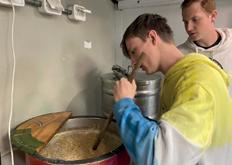
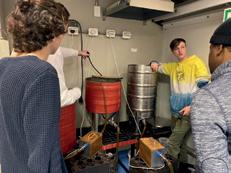
industry events. This includes home brew competitions; industry visits, such as their most recent visit to Heineken; and even an Intervarsity competition where the Brewery competes against several other tertiary institutions.

The Intervarsity brewing competition is hosted by AB-INBEV/SAB every year and is one of the Brewery’s favourite events of the year. A lot of preparation is put into the Intervarsity event. It is an excellent opportunity for students to get involved in all aspects of the brewing industry. The competition includes exposure to both the commercial and craft side of brewing beer and ciders.
The inter-faculty brewing competition held by the Brewery in collaboration with the Chemical Engineering faculty was also a great success this year. The final results of the competition included the final year chemical engineering students coming in first with their Candied Orange Indian Pale Ale (IPA). They
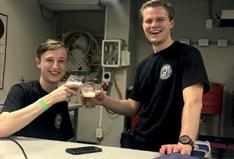
were followed by the third-year students’ Bacon Beer. The second-year students’ Belgian Dubbel came in third and the first-year students’ Tuks Lager came in last. The judging of the beers and the accompanying braai y had a great turnout, as many of the chemical engineering students and their lecturers enjoyed a Thursday night of festivities.
The Tuks Micro-brewery is open for any UP student with a keen interest in brewing and the beer making process. You can be from any faculty and both undergraduate or postgraduates are welcome. If you are interested in joining the Brewery, send them a message on their Instagram account (@ tuksmicrobrewery). For those of you who are not interested in joining the Brewery but would love to keep up with what they do, follow their Instagram page to keep up to date on any events they will be attending and how to get your hands on some of the beer and ciders they have been brewing.

 Ashleigh Pascoe
Ashleigh Pascoe
Megan Theunissen
Eddy was brought to the Onderstepoort Cat Interest Group when he was only one week old and in a severe condition as he needed to be tube-fed every two hours. Fortunately, he had been taken into the Interest Group’s representative, Helena Veysey’s care. A short while thereafter, Eddy was adopted into a loving home with veterinary nursing students, Nicola van Rooyen and Andre Louw. However, Eddy’s journey to recovery is far from over, as he continues to suffer from an inguinal hernia. In other words, his intestines fell through a small crack in his stomach’s lining, creating a hanging bulge that sits in the middle of his fluffy tummy. This means that his intestines could twist and cause severe discomfort and pain for Eddy.
The Onderstepoort Cat Interest Group recently decided to spring into action, hosting a cupcake-selling spree for everyone who wished to support Eddy’s recovery at a campus night market event on 19 August. The cupcake sale was a success and the entire night market experience brought a lot of attention to the Onderstepoort Cat Interest Group. The group also sells merchandise to raise funds for the many kittens that need care and/or medical attention.
Thanks to this event centred around the well-being of the campus’ animals, Eddy’s operation has been completed by Dr Hermien Viljoen. The group looks forward to hosting many more fundraising events to help save many more kittens like Eddy, the Onderstepoort kitty. This group has an Instagram account (@catinterest_op) and a TikTok account for those who wish to see their extraordinary work and announcements of upcoming fundraising events.
This month’s local book, Manifesto by Songezo Zibi, is not a doom and gloom text regarding everything that is ‘wrong’ with South Africa. Rather, it is more of an optimistic take on how South Africa can strive towards “something bigger [...] a belief that we can be the steward of our down destiny”.
This local book has a more serious undertone than previous recommendations, as the “promise of our Constitution” is a conversation that is repeatedly being had within the country, especially in educational institutions such as UP. The relevance of this book can also be attributed to its publication falling within this year.
A motif within the piece is the anti-immigrant mentality that has surfaced within South Africa and is acutely observed as a response to the broken elements of the country. The mentality is presented as a scapegoat upon which South Africans can cast their worries regarding; the abysmal unemployment rates, the inability of minimum wage to provide livable conditions, the price of food, petrol, etc.
Zibi says that “South Africa is in the hands of the old elite”, which further emphasises the role of the youth, especially their role in the maintenance and fair application of our democratic society in our current and future decisions. This role is designed to be practised through the “space of organised public contribution”, and not simply through beliefs shared within a private place or on social media platforms. For any substantive change to occur, whether within the the university, prospective municipalities, or government - the professional class (the people the country has educated), cannot continue to participate in forms of “activism that does not involve too much personal inconvenience”.
The book’s title reminds readers that change occurs within a culture where active involvement is the foundation of striving towards a country that accommodates all within it. The book has been written with the intention of helping readers with no background or understanding of politics, to understand the sociopolitical sphere South Africa currently resides in, and it can be said that the purpose of this piece has been successfully achieved.

The Tuks Gaming Society is back on campus for regular Dungeons and Dragons (D&D) games this semester, after two years of playing exclusively online. Though D&D and other tabletop role-playing games (RPGs) can be played online, half of the fun is in creating a collaborative, fantastical story with others around the same table.The society is offering anyone who wants to get involved the chance to delighty in a nerdy hobby. Combining improvisational acting, dice rolling and a lot of imagination, D&D allows players to step into a fantasy world and create a collaborative narrative (whether that be in a single session game or a campaign consisting of an extended story told over many gaming sessions). The DM (Dungeon Master, also known as the Game Master) takes on the role of creating a world in which the player’s characters can explore, fight epic battles and create chaos. The element of dice rolling to determine the players’ success adds a level of unpredictability that makes every game exciting. The game is growing exponentially in popularity thanks to online streams such as Critical Role and Dimension 20, as well as TV series like Stranger Things showcasing the hobby.
According to Marco Vermuelen, the chairperson of Tuks Gaming Society, 180 members signed up to the society at the beginning of the year, which indicates both the growing interest in D&D and the bonds that can be built through the game. It is a great activity to meet new people on campus, make friends and stretch one’s imagination in a setting that fosters fun and creativity. In fact, it is often creative approaches to the game
that yield the most memorable results. Though many familiar with D&D may think of it as a game to ‘win’, the storyline within a game can in fact be flexible enough to create unexpected moments. For instance, many obstacles found in the game can be overcome through peaceful methods, provided the player’s characters have the skills to do so. A recent example from one of the society’s sessions involved a troll on the run from a horde of goblins. The players, instead of simply seeing the troll as a threat, decided to try to save the troll. This created a far more engaging and unexpected narrative moment than wouldn’t have occurred if they had chosen to engage in combat instead.

Tuks Gaming Society currently runs its games on Tuesdays and Fridays in the Graduate Centre, room 2 from 17:00 to 22:00. The games are structured in a way that allows new players to drop in and out of the games depending on which sessions they can attend. So, anyone who wishes to try out a game also does not need to commit to playing in an extended story campaign.
The society also has plans to receive sponsorships which will give them access to more resources, including dice sets and handbooks that expand the D&D world. They also have a Discord server for society members to socialise and strategise between games, as well as numerous other video games and board games on offer. Anyone with a creative streak and a love of all things gaming will feel most welcome.




queer-friendly.
On 21 August, Block 22 hosted the first drag show in Hatfield and the venue was packed beyond capacity. This performance consisted of lip-sync numbers from the queens and interactions between the performers and the crowd. As the self-titled ‘Yanos Bar’, Block 22 has shown that inclusivity and opening doors to new things can indeed be fruitful and entertaining. In a society that can be deeply prejudiced, queer-friendly hangout spots, in Hatfield particularly, are far and few between.
The show, itself, was phenomenal and Block 22 was incredibly hospitable to the queens. The crowd was respectful and rules were set by the emcee, Aurora Crysis. When asked what the intention behind the show was, the queens shared that they wanted everyone to simply have a good time. Krystal Methany, the event organiser, pointed out that queer people and drag queens are not a threat to straight people, and that they have been hesitant to perform in ‘straight’ establishments, such as Block 22. However, the establishment being open to host its first ever drag show proves its efforts to become more inclusive and
Springbok, Block 22 and The Square 2.0, otherwise known as the ‘Hatfield Trio’, are particularly popular establishments amongst UP students, and this event could be a positive step for inclusivity in establishments based in Hatfield. Among the performers, was Lolover the Charisma Uniqueness Nerve and Talent Darling, a Black drag queen. Lolover shared their struggles of being Black and queer in South Africa. As one of the two Black queens in a cast of seven, the issue of diversity appears to be persistent in the Pretorian queer scene. Lolover stated that the White and Coloured queens make up the majority in drag, which demonstrates the tricky matter of diversity in spaces that are otherwise designed to be safe and inclusive. Block 22 has vowed to have a drag show every month of the academic calendar, and offered to lend a helping hand to queer students by providing a platform for self-expression and creating a sense of community. In the future, hopefully more establishments in Hatfield will follow suit. UP has an incredibly diverse student population, and having more establishments take steps towards inclusivity would provide more safe-spaces for the queer community.
With the stress of the new semester mounting, PDBY has decided to offer a potential stress reliever. This comes in the form of a good, oldfashioned pub crawl that accommodates everyone.

Route A is for those trying to save money on travel costs, as it is a walking route (recommended to be done in a large group for safety reasons), and it offers a far more authentic and immersive Hatfield experience. Route B, however, is for those who are willing to spend some money on transport (if a designated driver is not assigned). For those riddled with curiosity, Uber indicates that the travel costs for this route will amount to about R100 for every group of three.
Each route has two colour markers; red to indicate a mandated stop, while yellow indicates a suggested stop. These markers are for those who, as the night progresses, feel they want to cut the route shorter. This way, the designated partier can opt out without incurring the wrath of the group, while still

enjoying an exciting night out. Both routes have food stops to avoid going the entire night without food. The most important thing to remember for both routes, and this cannot be stressed enough, is to have a ridiculously fun time and make some

memories that can be shared in that dreary, forthcoming 07:30 class.
Pro-tip: A Powerade-Panado-Shower-Hangover cure is something that cannot be recommended enough.
[Block 22] being open to host its first ever drag show, however, proves its efforts to become more inclusive and queer-friendly
“Images: Cletus Mulaudi
The Association of Arts
Gallery in Pretoria
will celebrate its 75th anniversary on 27 September.
To mark this milestone, the gallery is unveiling a series of exhibitions to showcase local artists. Established in 1947, the organisation is known for its active involvement in arts and culture in Gauteng, as well as for hosting lectures and musical performances. To celebrate its anniversary, the gallery is currently hosting the first of three exhibitions, which showcases the works of local artists between the ages 20 and 40 years.
The gallery, itself, is a small building in Nieuw Muckleneuk. It boasts a sculpture garden and a large mosaic mural. Inside, the building is designed to allow the art to be viewed in natural light. The current exhibition displays artistic works in mediums ranging from; oil on canvas; to sculpture; to embroidery; to film. The scope of creativity on display is staggering, and the gallery does justice to these artworks by ensuring that they are preserved and showcased in optimal viewing conditions. Standout works in the exhibition include Peter Mammes’
intricately-drawn ink prints, and Danelle Janse van Rensburg’s mixed media pieces that utilise pencil drawings, wood carvings, and embroidery threads.

The gallery is a peaceful place to soak up creativity and inspiration, but it also contributes to the arts through programs that include art restoration and competitions to unearth new talent. The association partners with the New Signatures Art Competition every year to discover and showcase young artists. The winner each year exhibits their work in galleries around Pretoria, including the Association of Arts Gallery. The first exhibition was concluded on 20 August. The gallery is free to enter, however memberships are available to receive invitations to exhibition openings, lunchtime lectures, and musical recitals. The Association of Arts is an important contributor to the Pretoria art scene that deserves to be supported.
Ek Glo in Die Son - Fokofpolisiekar
Without You - Chunda Munki
Sonop-Blom - Bernice West

Ngozi (feat. AKA & Mustbedubz) - Benny Chill
Belie Polisie (feat. Jacques Leonard) - Loufi
Ain’t Nobody Got Time for That - Rubber Duc
Loving Me Wrong - Dean Fuel
Stimela - Phantom Steeze (feat. Costa Titch)
Cinimin - Hello Baby
First Year - Zebra
Zonke (feat. Ricky Rick, Costa Titch) - Mustbedubz
Doef Doef (feat. Katinka, Loufi, What die Faf, & Wortel Kombat) - Synth Peter
Sondela - Venom (feat. Yumbs, Raspy, Blxckie, Ricky Rick & Tshego)
Spring has finally sprung, and the simple act of making it through winter in Pretoria should be commemorated. Below, some social September activities have been outlined which is accompanied by a sneaky September/spring playlist.
Beefcakes Cocktail night @17:00
Beefcakes Cocktail night @17:00
Thirsty
Thursdays @ Geek House
Spring
The
Thirsty Thursdays
Geek House
Thirsty Thursdays
Geek House
Thirsty
Thursdays @ Geek House
@ Brooklyn
Bokke
Bokke
Hazel Food Market Hazel Food Market Hazel Food Market
Bokke
Micaela Wathen
The greatest benefit of being an athlete
– apart from the medals, the adoring fans, good health, camaraderie, and self-confidence – is that they would probably survive a zombie apocalypse. Athletes spend years training to run the 100 metres in under ten seconds, or to bat a ball at 90 km/h. They have been equipped with numerous skills and abilities that would be quite useful in fighting off rotting corpses.
athletes who sprint up and down a 100-metre field for nearly 90 minutes straight. The ability to manoeuvre themselves, as well as a ball, around their opponents, means they are
capable of ducking and dodging zombies with ease.
Defenders in particular are sturdy enough to stand their ground in a tussle with the walking dead. There is no real combat training in a footballer’s programme. However, in a life-or-death situation, it is plausible that the creativity a midfielder may use to create plays on the pitch would allow them to utilise the resources around them to fight back. A footballer’s downfall may be the way they dramatise their injuries. On the occasion that they do fall or are tackled while being chased down, they will not be spared a moment by the approaching zombies.
Now, moving on to martial arts. Martial artists – whether their discipline be karate, judo, or taekwondo – they are masters of hand-to-hand combat techniques that include punching, kicking, blocking, and grappling. These artists therefore have acute reflexes, incredible balance, and flexibility.

A martial artist will make greater use of their ability to block and avoid the advances of zombies, rather than
Franco Marais
PDBY attended various male residences’ sport matches on 13 and 17 August. The focus was on the third round of the men’s football league, as the semi-finals for the Res rugby will only be happening on 13 September.
The Tower 2 vs 1 Maroela
TUKS Bophelong 2 vs 1 Ekhaya
Amazambiya 1 vs 2 AOW FC
EBIT 2 vs 0 Urban Nest
House Tirisano 1 vs 0 House Theology and Religion
Respublica Eastwood 5 vs 4 Festivals Edge
Hatfield Studios 1 vs 0 Promaths Alumni SOC
Sun-TUKS 2 vs 1 Xayata
TUKS Village 0 vs 3 Hatfield Square
TUKS Dorp 2 vs 1 Rosendal FC
Law House 3 vs 1 Blossoms Delight
Nathouse 4 vs 0 Draegeana
House Ukuthula 1 vs 4 Melusi Shepherds
House Tau 2 vs 2 Rise FC
ZIMSOC 1 vs 6 Varsity Studios
TUKS Swazi 1 vs 1 OP Village
Studio@Burnett 10 vs 0 Commercii
Republic of College 2 vs 3 Tap FC
attack with raised fists. But this does put them at the risk of not creating enough distance between them and these potential threats. So while martial artists have fighting abilities which may be helpful, it does not guarantee survival.
Hockey players, golfers, and cricketers all have one thing in common: they could smack the wind out of a zombie if its lungs still required air. The use of a stick, club, or bat in the respective sports speaks to the amount of upper body strength they have developed, not to mention their accuracy. Each athlete’s swing is different and harnesses a different advantage. Cricketers bat balls that travel up to 40 m/s, which decreases the reaction time in their swings, allowing for quick takedowns if they find themselves in a one-versus-many situation.
Franco Marais
With cricket season approaching, PDBY interviewed cricket veteran Wisani Mushwana on everything cricket related.
The UP batsman started his journey at age five and developed a love for the sport after watching his older brothers play cricket. The Pretoria Boys High School alumni continued to pursue his sporting career all through high school and continued to speak about the support he got from those around him saying “there were also the amazing coaches I had supporting me all the time[...]”. When exiting high school Mushwana felt like UP was the obvious next step in his cricketing journey.
UP cricket is split into two groups, the elite group and the emerging group. The elite group consists of the first and second teams, while the emerging group consists of the lower teams are more of a social group where students can join to have fun. As for UP cricket’s goals for the season, he summed it up neatly in his opening statement, “we want to win everything,” he said with a chuckle. “But no, seriously, we want to win the Varsity Cup that is starting on 3 October. Then win the Pretoria league that follows and continues into next year […]” continued Mushwana.
As for his personal goals, he said, “obviously I want to make the starting line-up for the Varsity Cup, as no one is guaranteed a spot. I also want to be as involved with the team as I can be and help where I can […]”. Then when broaching the topic of what UP provides for their young athletes, he only smiled and spoke about how accommodating they are - whether it be class clashes, or even speaking to the coaches directly. Mushwana left the interview with some advice for any young player thinking of joining the cricket team - “get involved, ask questions, and work hard. We are a supportive community and are always trying to lift each other up.”
With the first team playing their games at the Tuks Oval on Hillcrest Campus and the second team as well as the women’s team playing at the Groenkloof Oval, the UP cricket teams invite all students to come and offer their support at the start of the season in October.
Mopane 1 vs 0 Maroela
Mopane 1 vs 0 The Tower
Rugby
Mopane 1st 47 vs 0 Maroela 2nd
Mopane 2nd 7 vs 21 Ekhaya

Sonop o/20 14 vs 14 Maroela o/20
House Tau 10 vs 10 VOB
Micaela Wathen
Hillcrest might be UP’s sports campus, but Hatfield campus is giving them a run for their money, or rather a ride for their money. UP’s newest phenomenon are their campus longboarders, who demonstrate the far reaching athleticism of UP students. Although, attention is afforded to the formal structures under which sport is conducted, with Varsity Cup and Varsity football being two of the most anticipated sporting events of the year, longboarding has proven that the beauty of sport carries beyond the confines of a track and field.
Longboarding is a form of land surfing that originated in Hawaii in the 1950s. According to Longboard History by Benjamin Harrington, a writer for Outdoorboarding. com , longboards come in various shapes and sizes due to the varying techniques and uses that riders have developed. The primary use for longboarding among UP students, and riders globally, is transportation. However, longboards have many other uses – for example, downhill bombing, freeriding, and longboard dancing. Similar to skateboarding, longboarding is still in its formative
stages and has not yet become a mainstream sport. Still, the tightness of the community has created a palpable culture that has affected music, art, and fashion.
Longboarding ranges from being casual and calm to being quite the daredevil’s sport. Freeriding and longboard
dancing remain highly technical but are not as shocking as downhill bombing. Now you may be wondering what downhill bombing is - essentially, it is riding a longboard down a hill at speeds of up to 120 km/h while maintaining control over the board. Feats such as these demonstrate the fearlessness, physicality, and adventure-seeking nature of longboarders – qualities that should be highlighted above the stereotypes.
With all students back on campus, more longboarders can be seen cruising in and around Hatfield. This led PDBY to interview longboarder, Joshua Hunter, who commented that he was extremely excited to see an influx of people on campus with whom he shares a common interest.
The longboarders of UP are coming together to create a group of riders, the Campus Cruisers (the name is still being finalised), who will meet up and cruise around campus. They are looking to form a group chat and invite anyone on campus who has a board or is eager to cruise with them. These riders aim to create a space where newcomers feel comfortable learning how to longboard. Alongside this, they wish to explore the different elements of longboarding and build up the small community at UP. Image: provided


Precious Maphupha
9August 2022 marked the 66th anniversary of the 20 000+ women who marched to the Union Buildings to protest against the Pass Laws that were to be extended to women. To wrap up Women’s month, PDBY decided to shine a light on the sportswomen of UP and their successes at the recent Birmingham Commonwealth Games as they pave the way and inspire a new generation of young UP sportswomen.
Zeney van der Walt
Zeney van der Walt is a 22-year-old UP athlete currently studying a BEd Senior Phase & FET. At the 2022 Commonwealth Games, she took bronze in the 400-meter hurdles final, with a personal best of 54.47 seconds. In an emotional Instagram post, she said she was “grateful to run and leave [her] heart on the track”. A large infectious smile is a common theme on van der Walt’s Instagram as seen when van der Walt posed with Jamaican athletes holding her South African flag after winning the bronze.
Erin Gallagher
Moving on to UP swimmer and BSc student, Erin Gallagher, who is only 23-years-old and has already won a silver medal at the Games, with a time of 26.05 seconds. This placed her second, along with Australian swimmer, Holly Barratt, in the women’s 50-meter butterfly final. Gallagher highlighted the importance of this experience, and how this win did not define her or her abilities. She went on to write a personal note about how this experience allowed her to come to the realisation that she has always been enough despite the many discouraging struggles she has had to face.
Gallagher is rarely out of her swimming attire on her Instagram, and she seems to always be drawn to a body of water.
Kaylene Corbett
Speaking of Gallagher’s swimming friends, one that you may recognise on Gallagher’s Instagram is 23-year-old, Kaylene Corbett who is a fellow UP student studying a BEd. She won gold and bronze in the women’s 200-metre breaststroke final alongside UP alumni, Tatjana Schoenmaker.
They won the gold with a time of 2 minutes and 21.92 seconds and bronze with a time of 2 minutes and 23.67 seconds, respectively. When asked about Corbett, Schoenmaker told TuksSport that she knew Corbett could do it and that, “she only had to believe she was good enough to win a medal”. Clearly, Corbett was able to find this belief in herself but also seems to have left it to her faith in God.

Donne Breytenbac
A special mention should be made to 20-year-old, Donne Breytenbach, a rising judo star who won silver in the 57kg African Championships, when she was only 19. Breytenbach made history by going to the Commonwealth Games with her twin brother, Thomas Breytenbach. This is seemingly the first time in South African history that twins represented South Africa at the Commonwealth Games at the same time. We hope to see more of both of them representing South Africa and UP in the future.
Rounding off our excellent UP women at the 2022 Commonwealth Games are alumni, Tatjana Schoenmaker and Geronay Michaela Whitebooi.
Tatjana Schoenmaker
Schoenmaker seems to constantly pop up in UP sports articles, and this is because she has not slowed down since her momentous win at the 2020 Olympic Games. Her and Kaylene Corbett took gold and bronze in the women’s 200-metre breaststroke at the Games. At 25-years-old, she has only proven how much of an inspiration as she was was not only named in Forbes’ 30 under 30 list of 2022, but also started the Tatjana Schoenmaker Foundation. She posted about it on her Instagram, saying that she hopes that it “will be a shining light” and “a blessing to others”. She also states that she was helped financially by fellow South Africans through crowdfunding, and she wants to do the same to help others through this foundation.
Geronay Whitebooi
If you read our sports spotlight article focused on judo, Whitebooi will not be a new name to you. The 26-year-old UP graduate won a gold medal in the women’s 48kg category for judo at the Games and was not shy to thank TuksSport and TuksJudo in her Instagram caption after winning. Her Instagram is filled with pictures of herself living an everyday, normal life as well as moments taken from her judo tournaments and training. One can see that fitness is important to Whitebooi, and as the champion of the 48kg women’s category, her focus on fitness has paid off. Other highlights you can see on her page are of the 2020 Tokyo Olympics, where she was present.
This article is just a showcase of some of the UP and South African women who represent us in the world of sport while also showcasing their resilience and never-die attitude. Our alumni have repeatedly epitomised this attitude after losing big games by picking themselves back up and coming back stronger, finishing what they started, and truly embodying the saying “wathinta abafazi, wathinta imbokodo” meaning “you strike a woman, you strike a rock”.
Image: Anton Geyser/ South African Sports